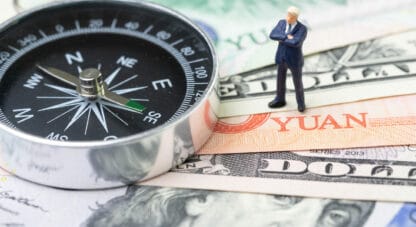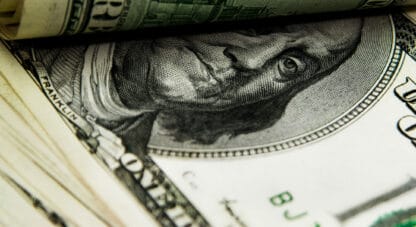About this week’s show:
- Governments always indulge in inflation
- Inflation destroys trust in more than money
- Unlimited credit creation the new “printing.”
- Be sure to read, What is Real Money
About Adam Fergusson: Adam Fergusson is a British journalist, author and Conservative Party politician who served one term in the European Parliament (MEP). He has remained involved in the field of European Union affairs since, as a Special Adviser to Conservative governments and as a business consultant. Among other books, he wrote When Money Dies, a classic account of hyperinflation in the Weimar Republic. It deals with not only the economic impacts that hyperinflation had upon society in the Weimar Republic, but also the way that society itself changed. First published in 1975, When Money Dies was hailed as a cult classic in the wake of the Financial crisis of 2007-2010, with copies changing hands on eBay for up to $1000. As a result, When Money Dies was republished in July 2010, becoming an internet sensation after allegedly being commended by financier, Warren Buffett.
The McAlvany Weekly Commentary
with David McAlvany and Kevin Orrick
Kevin: We’ve read many books in this office, David. You are very insistent on our continued education. One of my favorite books was written by a man in the 1970s named Adam Ferguson, we’ve talked about it many times before, When Money Dies. You’ve told us, over the airwaves and here in the office, that we see things go from the financial to the economic, from the economic to the political, from the political to the geopolitical. But there is a human element in every one of those levels, and probably, you see that no more brought out than when you have a hyperinflation or a war. This book is about both, isn’t it?
David: It is. Mr. Ferguson has been a member of the European parliament. He was a special advisor at the foreign office, and was a part of European affairs for international industry and commerce, as well as a political advisor during Maggie Thatcher’s government. He comes to the issue from an official position, a decision-maker, as someone who is influencing decisions, and yet this is a very personal tale, wanting to appreciate the impact of inflation on his family, on great Britain. Keep in mind that in the 1970s inflation was raging there, just as it was in the United states, and it was creating social disruption, it was creating worker’s strikes, it was creating pain for savers and those living on a fixed income. These are issues that people encounter and they are real world issues where the rubber meets the road.
Kevin: So often when we are talking to clients, they say they don’t necessarily understand what the CPI is. They say they don’t understand all the things you talk about as far as numbers, charts, and statistics. What they understand is the human element, the impact that it is going to have on their families. Really, when he wrote this book that it what it was about. He didn’t want to make it an economic book. He wanted to make it a human experience book, because there is pain.
David: There is this idea: What has government done to our money? The conversations that I have had around the dinner table, and I think these are conversations that everyone should have around the dinner table, is that inflation is a perennial issue. Inflation is something that governments around the world, in all periods of time, do to their currency. In an attempt to gain votes they over promise and over spend, and ultimately, play the catchup game via printing more money to get that done. This is not something that was just an issue 80 years ago, 90 years ago, in Weimar, Germany. This goes back to the third century; this goes back to the second century. As far as you can take recorded history back, we have struggled with inflation. We saw this with the denarius. We’ve seen it with the pound sterling, perennially. We have seen it with, obviously, the German mark. In the modern context, the U.S. State Department has created a hyperinflation in Iran in the last 24 months. These are things that, whether it is past tense for the historian, or present tense for the current market observer, are real concerns, because ultimately, who are we concerned about? Real people. Our families.
Kevin: We’ve read many books on inflation. I would have to probably put this at the very top of the reading list. That is why I was thrilled that Adam Ferguson is our guest today.
David: Keynes said that not one in a million understood inflation and that may be true, even after going through a severe inflation. Money printing is very often not seen as the cause, but what we do have are the experiences of people during episodes of inflation, which have left their own unique scar tissue. I think what makes the book When Money Dies a particularly important and unique book in the variety of books that have been written on inflation is that it deals with people and money, not just money and statistics. When you are dealing with a nightmarish scenario, I think this brings a very unique insight. You had Jacques Rouffe who wrote The Monetary Sin of the West in the late 1960s, you had Hayek, who received the Nobel prize in Economics in 1974.
Adam Ferguson, thanks for joining us. You wrote When Money Dies in 1975. What was your motivation for writing it?
Adam: My book was never intended as one strictly on economics. In the early 1970s in Britain we were at the beginning of one of the worst inflations that we have had during the 20th century, and I was deeply disturbed to see the effect of inflation on people, including me and my family. Of the steady collapse in value of their money, although it never reached more than 22% in a matter of a few years. But we were frightened. We were searching for safer places to keep our money, looking at other currencies and material goods, better shares, anything but bonds, and inflation was causing social disruption, pain for savers, prompting strikes for higher wages for those who could strike, which was of course no resort for the self-employed or pensioners. And there were signs of panic and corruption which were not so very far apart. So, I decided then to examine the classic case of severe inflation, which was post World War I Germany, to see how they reacted, and I find that if you have the same disease, you have the same symptoms, and the same sort of human misbehavior and misery in whatever proportions. I think that answers your question.
David: Very much so. It seems that today we have a similar iteration, and again, if you are talking about the disease and the symptoms, today we have the Bank of Japan and the Fed. These are government-run pyramid schemes, expanding the monetary base to buy government bonds, and so, with that as a current tense backdrop, let’s look at all stages of inflation. Let’s look at all episodes of inflation. Some periods are quite benign – low levels of inflation, not particularly concerning, and then you have others which are very malignant. What are those stages, and when should we be concerned? Is there a point of no return?
Adam: It’s a good question. In an economic society inflation strikes unfairly, which is to say sometimes it is benign and sometimes it is malignant. The most vulnerable are the old, those on fixed incomes, savers, self-employed, anyone who has no protection and nowhere to run. They are the people who suffer. Others, like speculators, and people with heavy debts, may benefit from it. But no one benefits more than over-indebted governments. And it’s their deliberate money creation which causes inflation and reduces the real value of what they have borrowed. So you have both the benign and the malignant, if that’s not too strong a word about governments, to consider. Central banks tend, nowadays, to hold at a 2% inflation rate. It’s beneficial. And it guards against the contrasting, but not strictly opposite, danger of deflation. But I would say that 2% inflation, deliberate by the government, is robbery just the same. And the danger point, because you asked if there is a point of no return, is when people lose their trust in money and don’t want to hold it. It’s when the bank loses control and the quantity of money becomes less significant in causing values to drop than the velocity of circulation. So, I think the point of no return is when the bank loses control because it has lost the trust of the people.
David: Inflation is something that is confusing to many people. What it is about inflation that people should care about?
Adam: I think the answer is, again, what it does to the vulnerable. It is the fact that it comes back to what the nature of money is, which people often think they understand, and which governments often do not. What is money? It is the repository of trust, and the people who are responsible for maintaining that trust are the people who should care. The responsibility of those in charge of the trust in people’s money is enormous, and that is what we should care about.
David: You said in the book When Money Dies what really broke Germany was the constant taking of the soft political option in respect to money. The road to hyperinflation was not merely one of financial missteps, but it had a moral component to it, as well. Could you explain that?
Adam: Yes. But neither Germany’s government, nor its central bank understood monetary theory. They really believed that inflation demanded the printing of ever more money rather than that money-printing caused inflation. And this ignorance was, of course, fatal. The demand grew, almost exponentially, for bank notes of ever greater denominations, to buy ever more expensive goods. It didn’t stop. And the government and the banks found they were riding a tiger. Post 1st world war Germany was threatened by putsches, by red revolution following Russia’s in 1917, by vast unemployment, and of course, the cost of war reparations. And the political difficulty was huge, of withholding the bank notes from a starving, desperate population, whose army had been defeated. The printing could only be stopped eventually when bank notes had become completely worthless and a new currency was actually possible.
David: We look at all of the anecdotes that you chronicle, a fascinating study that you have done, most of it drawn from journals and personal experiences, firsthand accounts of what individuals and their families went through, but as you chronicle all of these anecdotes from 1919 through 1924, and the hyperinflation, which do you feel best captures the effects of inflation on people and on communities, ultimately on nations.
Adam: Yes, they are 70 stories, like the starving townspeople who went into the countryside to take the food that the farmers found no financial point in bringing to the market. Corruption was breaking out among the previously incorruptible in civil service, this sort of thing. But I would like to mention the episode in, I think, September 1923, when the mark’s value against the dollar was rising so fast that the trade unions didn’t even know how much to strike for, but what they should have come out for was striking for a stable value for the money they had, and this is a very central part of the whole inflation illusion. People think their money is going up, when in fact, it is going down against whatever benchmark you happen to choose. In the case of Germany, it was always the dollar.
David: I had this conversation with my boys last night, and the idea that they would have more money in the context of inflation was immediately appealing to them, and then when I was describing the loss of efficacy I thought that the only way that they would fully understand this is if I pour a glass of whiskey, and so I did. I poured a glass of Irish whiskey and allowed them to dip their finger in it, just to taste how powerful and strong it was, and then I poured in a gallon of water, and had them smell and taste again, and there was nothing left of what you would consider real substance.
Adam: I like that. It would be easy to be in Zimbabwe today, people are millionaires because their bank notes have 10 billion written on them, but it means nothing.
David: I left the boys as multi-millionaires last night, one with a 10 million mark note, and the other with a 2 million mark note. There was obviously some feeling of unfairness in the 2 versus the 10. But back to the German inflation. The German inflation really made Hitler’s rule possible. And of course, there was the votes that he needed, which were provided by the high rates of unemployment present in that era. Do you attribute his success to the Treaty of Versailles and the seeds of conflict that were planted by the Allies?
Adam: To some extent, it was true then that the seeds of the next war are always implanted in the previous peace treaty. And certainly, the resentment against the terms of Versailles were very, very great, and Hitler was able to expand on that, both in the very early ’20s, and after he had been in prison in the late ’20s. It is a cynical, but not unarguable, view that in Europe World War II was simply an extension of World War I, when Germany had recovered enough to continue it. But hyperinflation and the political and social unhappiness it brought really destroyed the chances of real democracy taking root in post Imperial Germany at all, and the Weimar Republic’s chances of success were finally knocked on the head by the Great Depression, which came, after all, quite a long time, five or six years, after the great inflation had ended and the Great Depression was Hitler’s moment to come forward and succeed in becoming the strong leader that Germany thought that it needed.
David: Yes, clearly, it is not axiomatic that hyperinflations create Hitlers.
Adam: No.
David: We do see social chaos, we see violent blame-shifting, people searching for answers in the context of both a monetary and financial chaos.
Adam: Yes, the idea that it caused Hitler, I don’t think is an idea that is particularly worth pursuing in terms of historical explanations of what happened, but certainly it is a factor.
David: We know that hyperinflation comes at a high cost, really to everyone. Who bears the cost of a minor inflation, and is a hyperinflation very different?
Adam: I think the answer to that is that we all bear the cost, financially, morally, and socially. The dollar and the pound, for example, have lost far more than three-quarters of their purchasing power since my book was written. That was nearly 40 years ago and I think the pound is down by nine-tenths. Now, that would be hyperinflation if it had taken place over a couple of years. So, the difference between inflation and hyperinflation, you could say, is not in quantity, but in time. But, of course, there is all the difference between a gale and a whirlwind, if you compare the forces of nature that are going through and can be coped with. In the gale, they can be coped with. In the whirlwind, they can’t.
David: So, the compression of time, the intensification of the event, and it being really unbearable in a short time frame. As you suggest, though, the consequences are as severe, though less recognized, if you look at the loss of nine-tenths of purchasing power. This is the pound sterling, what was the world’s reserve currency. The U.S. dollar, three-quarters of its value lost, as well, or more, in the same time frame. And yet, because it was stretched over a long enough period of time, we go back to that notion that Keynes said not one in a million understands inflation. In fact, the folks that are managing our money system today would say that what they have gained for us in the context of slaughtering our currencies has, in fact, been beneficial because we have avoided the deflation boogeyman.
Adam: I don’t think that deflation and inflation are exact opposites. If inflation was bad, then the deflation should logically be good, but it is not. And what everyone really needs is stability, and these two concepts come on either side of stability, and one is negative in curiously different ways.
David: Inflation and deflation, not exact opposites, as you say, and there are episodes, in fact, of deflation being quite positive in terms of an increase in purchasing power for the individual, and yet, this benefit to society is not taxable by government. So, there tends to be this inflationary bias, I think, in part, because it becomes, in nominal terms, a great boon to government, an increase in revenues year after year.
Adam: There is no question that inflation is something which has been here for a long time, and will always be with us, because it is any government’s way of eliminating debt run up over things that have not been productive at all, whether it is your welfare services, or your army abroad, or whatever, these are not productive matters, and inflation alone can help governments to pay for such possibly perfectly beneficial things. But inflation is something which governments have always, and always will, indulge in, and try to get away with as much of it as possible. To ask for stability of the currency they produce when they are running up debts of that kind is simply not realistic, which is unfortunate, and it affects us all. The question is, to what extent these deliberately inflationary policies, necessary ones, perhaps, can be controlled, and can be stopped from getting out of control.
David: The last five years we have seen plenty of creativity applied to monetary policy-making, out of the box thinking, you could say. One of our commentary guests, Andrew Huszar, was the director of the first round of quantitative easing, the purchasing of better than a trillion dollars in mortgage-backed securities. It makes us reflect on deficit financing of this kind. This may have been a stopgap measure. Has that proven itself effective in the past – deficit financing – and regardless of the euphemism, quantitative easing, isn’t money-printing still just money-printing?
Adam: They are staggering sums, what you are talking about, but I think that today we are into a new ballgame, which is still imperfectly understood. Huge quantitative easing and low interest rates, which we have on either side of the Atlantic, don’t sit comfortably together, even as twin crutches to boost an economy, neither in Britain, nor in the U.S., nor in the Eurozone, in all of whom I think inflation has been curiously low, except, rather tellingly, in the housing sector. Can we be sure where this new money has all gone, or where it may be lurking, or what pressures it might create one day, and what mayhem it may yet cause? We don’t know where it is. It certainly has not gone where it was originally intended that it should go.
And yes, there have been many examples from the Mississippi bubble, or the French Revolution, to Pennsylvania in the 1840s, of deficit financing which has gone wildly wrong. I can’t think of any large-scale example that has gone right, but it depends what you mean by effective. Many pensioners and holders of bonds, and many importers would not agree that it has been effective at all. Others might say it has saved them from immediate disaster. But what does effective mean? Certainly, it has helped governments out of immediate problems, but it has almost always landed them in bigger ones later.
David: The scale and the scope of debt, it seems that the first signs of real stress and strain on the financial markets comes from an over-commitment, long-term obligations which can’t ultimately be met, which brings out the temptation to inflate, and we have a unique situation in the United States that we can, at any point, and perhaps this is true of any government, but we can, at any point, change the methods that we use to count inflation, so that we may create it and we may cover over it, and it takes some sleuthing to determine what real rates of inflation are, but it seems that our foreign creditors are, today, comfortable with official rates of inflation being in that 1.8 to 2.1% range, although the realities that the consumer faces are quite different. Maybe it is 2%, or 4%, or even 6% or 8%, depending on the methods used to count inflation.
One thing that is different, perhaps, now versus in other periods of inflation, we think of Weimar Germany, we think of Zimbabwe more recently, Hungary in the 1990s. Bank notes are not as physically critical to the economy as they once were. Credit is the new currency, whether it is credit cards, debit cards, we can digitally create billions, hundreds of billions, out of nothing, in a nanosecond. Does this change in the nature of money from a physical bill to something of credit. Does that alter your views on inflation?
Adam: Yes, it must have changed things, in every possible way. And I think that trust has become even more critical, trust in the constancy and the stability of the currency has become even more critical, and especially in relation to the velocity of circulation. As I say, we are in a new ballgame when, as you said yourself, credit increases so quickly, or by citizens, themselves, with their own credit cards. In Germany of the 1920s, there was a physical limit to the outpouring of bank notes. Now there is absolutely none to money creation, and indeed, what we see in Europe and America and Britain, often promises that the amount of extra money, if it is needed, will be unlimited, and this should be terrifying. The central banks must be playing with fire. But why people are not yet terrified by the total availability of endless money is not entirely clear and that is why things have changed.
David: Much of your book reflects on the consequences of inflation for people and we discussed earlier there being a moral component. What happens to values, not the values of things, but the values of people, in the context of a severe inflation?
Adam: This was very much what I was studying when I read the book, and the answer, inasmuch as there is an answer, is that no one knows best how to respond to severe inflation. Their character almost changes. They become suspicious that others know better and are coping better with the problems than they are. So much is viewed still today as then in terms of money, social status, possessions, prospects, and when the security of wealth disappears, moral values deteriorate, corruption may follow, and in due course, social cohesion breaks down. So, I think that is the answer. An unstable currency, when you can’t trust what you are used to trusting as a measure of everything important to you, when that happens, the knock-on effects, socially, morally, politically, are inevitable and unfortunate.
David: Reflecting back to the anecdotes you shared earlier, there is a family in our office who went through the hyperinflation, and the family loaned money to a neighbor to build a house, and that loan was paid off in the context of the hyperinflation, with a single chicken. Some have suggested that inflation profiteering, that is, borrowing money, and paying it back with devalued currency units, runs the risk of that debt being indexed or marked up, even on a retroactive basis. You have this contrast of a large sum of money paid off with a single chicken, or the indexing of debt. Is this a real concern?
Adam: I suppose, of course, it must be. It comes back to the question of trust in money, that is, trust the trade. I supposed it must be a real concern. And retrospective recoveries by treasuries are certainly not uncommon and they are certainly unpopular, as well. But profiteering at the scale that was done in Germany, and not only just by single people repaying a large debt with a chicken, but in what was done by the great profiteers who were borrowing money from the central bank, setting up factories, and then paying the debts, the cost of those factories would be the cost of a week’s profits of the manufacturing they were producing. There were many examples of that, and that grossly upset the German economy at the time, the vast industrialists who took Germany for a ride on the basis of borrowing cheaply and paying back later at the nominally small rates.
David: There are tensions that can be felt as you look at capital flows. Today, you might look at the Treasury reports of money that is leaving China, and some of the unexpected changes, perhaps, that the ruling class is going through as they moderate the business model that they have used for the last 20 or 30 years, and are anticipating significant changes. We see capital flight in that instance. That is a modern day issue, but it is also a past tense issue. What does capital flight tell you about a currency’s perceived value?
Adam: It must, once again, reflect lack of long-term trust in a money, in a currency, and it happens probably at every level, I would think, with a popular or international, or commercial, or concerning investments, people will get out of a currency if they feel that their money is no longer safe there. Capital flight in a big way, I don’t know enough about it to be able to say, but it is not only capital flight, but the long-term effects, for example, of American trade with China, where China now holds vast amounts of U.S. treasury bonds which they can’t get rid of. America and China are locked together in a sort of wrestling hold. Neither can let go. If China gets rid of its American bonds, then the value to them will collapse, as well. It is a sort of mutual destruction situation which economists look at aghast and wonder how anything is going to be unscrambled at all.
Capital flight? Yes, it obviously indicates total lack of belief that any currency or any economy is going to last. We have this coming up in Britain at the moment where the possible, but unlikely prospect that Scotland and England will separate. Already, there are is much talk of people getting their money out of Scotland, the banks leaving Scotland, industry leaving Scotland, if by any chance Scotland were to go independent. That is capital flight, and it certainly has close relations to the perception of the value of the currency.
David: In almost every past period of monetary mayhem, there was a hard currency alternative to flee to. Even in the 1970s, you had the Swiss franc, which was largely, significantly, gold-backed. Where do global capital flows go in a world of entirely fiat currency choices?
Adam: It’s a fine question. On a personal, individual level, gold bugs will tell you one thing – gold. Your stock broker will tell you another. Art dealers and that sort of people will tell you a third. But global capital? Bitcoins? Spreading capital widely is the easy, usual answer to the question: Where do you go? And of course, you may be lucky, but there we are again, the world has changed, it’s not much good going to the Swiss franc any longer, gold goes up and down, we used to go for the dollar, but that goes up and down, and the answer is, nobody knows. My answer is that I don’t know.
David: There are similarities today, maybe just at the front edge in terms of similarities. The investment markets today are driven by speculation, and those living on a fixed income pressured to take more and more risk to meet their income needs. And perhaps it was different, the currency markets were one of the main places where you saw forced speculation in the Weimar period, but investors are not judging things on the basis of risk or absolute values, they are looking on the basis of necessity at meeting needs, and that already speaks to a certain level of desperation because of monetary policy. And yet, our monetary policy mavens, they are not connecting the dots and seeing that they are creating problems, as well as, potentially, solutions in other areas. What could we learn from the people in Germany, the banks who said, “The mark is the mark,” with this sort of undying sense of destiny and permanence?
Adam: What do we learn from Germany? What is interesting is what Germany has learned from its own past. One of the reasons why the eurozone is, today, in such a tight bind with itself, is because of Germany’s own obsession because it has had its hyper-inflation twice in the last [unclear] years, obsession with the real value of money, of fighting inflation at every possible moment. The basis of the euro, after all, is that inflation must remain stable, as stable as the deutschemark was before Germany joined it.
It comes back, once again, if I can go on for a second about the nature of money, which is still under discussion, it is surely supremely money, a store of trust, whether it comes in gold coins, or seashells, or paper promises, and those responsible for it mustn’t betray that trust. I’m talking of governments, central bankers, and economists. And this applies more greatly than ever, I think, to the dollar, which is the only real reserve currency in the world, which makes the Fed’s responsibility for maintaining the value and the stability of the dollar. Their responsibility is global, yet it understandably acts principally in the national interest, so the Fed, there, also has a problem. Its responsibilities are worldwide because of the nature of the dollar and yet it has to, at the same time, cover its very important duty of looking after the domestic dollar first and foremost. And often, these two duties have to conflict. I come back, once again, to my main message: Trust in money is an important thing to maintain.
David: We thank you so much for taking the time to explore, to exercise your curiosity in the 1970s and continue to ask questions and seek for the answers to what the effects would be on your family. You have opened up unique insights beyond the statistical revelations of loss of purchasing power, and again, numbers that sometimes people, when you get into the billions and trillions, in terms of those figures, lose touch with, and you have done a masterful job of connecting the reader with the realities of inflation, with the familial realities, with the individual stresses and strains, with the issues of national identity and loss of purpose. There are many things here that are of a psychological and social nature, and I think you have made a very significant contribution to the understanding of inflation, and so I thank you for joining us today, and we look forward to any books that you may be printing again. It took us a long time to see this book reprinted, and I hope it is selling well. I know that through our office we have recommended it to thousands and thousands of people, as an invaluable resource for understanding the nature of inflation.
Adam: You are very, very kind, and thank you very much, indeed.
















